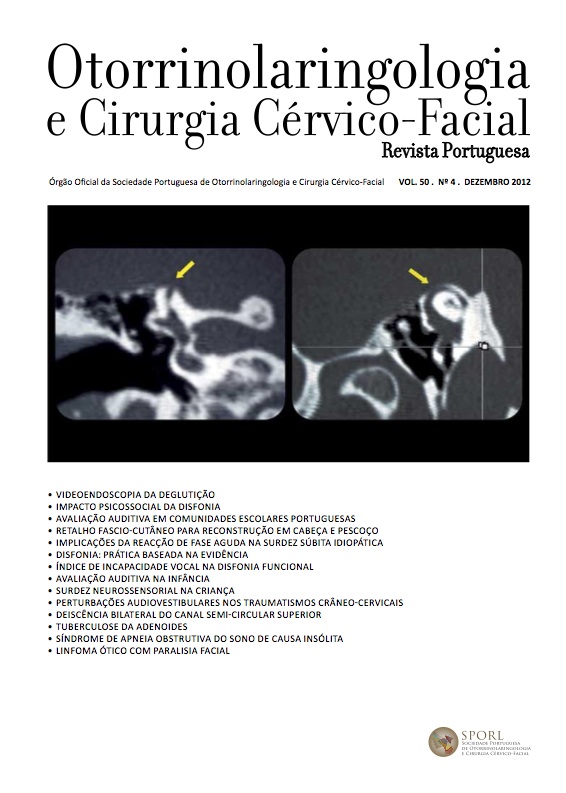The psychosocial impact of hoarseness - What relationship?
DOI:
https://doi.org/10.34631/sporl.57Keywords:
Dysphonia, professional voice, psychosocial impact of voiceAbstract
Objective: Evaluate the relationship between the psychosocial impact and the severity of dysphonia and to verify if the psychosocial impact differs significantly according to the different vocal needs in professional contexts.
Materials and Methods: Retrospective study of the psychosocial impact of dysphonia (VHI) in 390 adults, 91 men and 299 women, aged ≥ 18 years with dysphonia of nonmalignant etiology.
Results: There is a positive highly significant relation (p ≤ 0.001) between severity of dysphonia and the psychosocial impact on quality of life. The females exhibit higher levels of psychosocial impact than men, but without statistical significance (p ≥ 0.05).
Conclusion: Any adult with dysphonia, regardless of grade, showed a decreased quality of life even for those who don’t have a professional use of voice. The more the degree of dysphonia increases there is a significant reduction in quality of life.
Downloads
References
Guimarães I. A Ciência e a Arte da Voz Humana. Alcoitão, Escola Superior de Saúde de Alcoitão; 2007.
Jacobson B, Johnson A, Grywalski C, Silbergleit A, et al. The Voice Handicap Index (VHI): development and validation. Am J Speech-Language Pathol. 1997, 6: 66-70.
Freeman M, Fawcus M. Distúrbios da Voz e seu Tratamento. Terceira Edição, São Paulo, Livraria santos Editora; 2004.
Guimarães I, Abberton E. Na investigation of the Voice Handicap Index with speakers, of Portuguese: preliminary data. J Voice 2004; 18(1): 71-82.
Koufman JA, Isacson G. Voice Disorders. Philadelphia: WB, 1991.
Timmermans B, De Bodt MS, Wuyts FL, Boudewijns A, et al. Poor Voice quality in future elite vocal performers and professional, voice users. J Voice 2002; 16(3): 372-382.
Putnoki SD, Hara F, Oliveira G, Behlau M. Qualidade de vida em voz: O impacto de uma disfonia de acordo com o género, idade e uso vocal profissional. Revista da Sociedade Brasileira de Fonoaudiologia. 2010: 485-90.
Aimee CEL, Melfred LH, Erasmo GDV. Measurement of the Handicap of Dysphonic Patients using the Filipino voice Handicap Index. Philippine Journal of Otolaryngoloy-Head And Neck Surgery. 2010; 25(1), 7-12.
Costa OH, Matias C. O impacto da voz na qualidade de vida da mulher idosa. Revista Brasileira de Otorrinolaringologia. 2005; 71(2): 172-8.
Spina LA, Maunsell R, Sandalo K, Gusmão R, Crespo A. correlação da qualidade de vida e voz com actividade profissional. Revista Brasileira de Otorrinolaringologia. 2009,75(2): 275-9.
Bouwers F, Dikkers FG. A Retrospective Stuy Concerning the Psychosocial Impact of Voice Disorders: Voice Handicap Index Change in Patients With Benign Voice Disorders After Treatment (Measured With the Dutch Version of the VHI). J Voice. 2007,23(2): 218-224.
Bogusz NE, Kuzanska A, Woznicka E,& Kowalska SM, Assessment of the Voice Handicap Index as a Screening Tool in Dysphonic Patients. Folie Phoniatrica et Logopaedica. 2011, 63: 269-272.
Johns M. Update on the etiology, diagnosis and treatment of vocal fold nodules and cysts. Curr opin Otolaryngol Head Neck Surg. 2003; 11:456-461.






